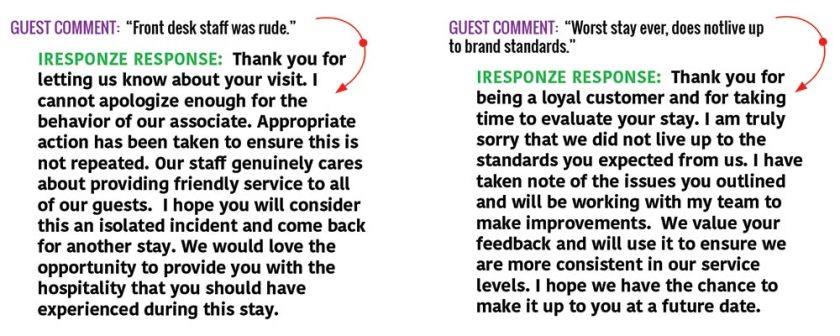
Three Ways to Manage Your Online Reputation
Jill Ellis | Contributing Blogger
In just two years with a startup, I feel like I’ve learned a lifetime of lessons. This seems to be a recurring theme with other entrepreneurs, and although I was fortunate to work with many successful entrepreneurs in the hotel industry, I didn’t understand what they faced until I was on the inside of a startup. In a short period, I have experienced how to approach the unknowns, how to learn on the run, and how to respond and adjust course in real time. I find it hard to think of operating any other way now, and I’ve come to understand that on a daily basis, hotels face the same opportunity to listen, respond and react to feedback, which their guests are sharing more and more frequently.
Your guests are talking about you – not necessarily in person but in online reviews – and what they’re writing makes an impact on your hotel’s revenues. Online reviews do impact purchase decisions. Any number of resources confirm that your guests are looking for confirmation of everything from hotel selection to clothing choices. While you cannot control that conversation, you can control how your hotel is perceived and maximize your influence on selection and purchase.
Here are three ways responding to reviews can improve your hotel’s guest loyalty and satisfaction.
Inside Out
As any manager knows, praise and constructive advising can motivate employees and that motivation can result in improved guest service. Positive online reviews provide an opportunity to highlight exemplary performance by your staff. Respond to a positive review, not just with a thank you, but also with a commendation for the housekeeping staff or maintenance team who might be mentioned. And don’t stop there. Print and post the review and response for all staff to see.
Negative reviews also provide an opportunity for staff development. Of course, respond with sincerity, letting the guest know that you are as disappointed as they are.

You might also inform the guest that you are sharing the review with your staff so that they can address the issue through training. Again, share with your staff in an appropriate manner, whether it is a one-on-one meeting with an individual or a departmental conversation to discuss improvements.
Boost Your Rankings
Many online travel agencies (OTAs) adjust your ranking based on the number of positive reviews your hotel receives. Per a Cornell School of Hotel Administration study, encouraging guests to post reviews will improve your hotel’s Global Review Index™ (GRI is used to benchmark a hotel’s performance over time). Just one point of GRI improvement equals 0.89% in ADR plus 0.54% in occupancy, which is 1.42% in RevPar. One caution, though: today everyone is asking customers to submit a review or complete a survey. Make your request to review easy to complete and don’t ask too many times.
We know that guest reviews positively impact rates, but can responding to reviews also positively impact your rates? At iResponze, we believe so. If 92% of consumers now read online reviews, up from 88% in 2014, and 40% of consumers form an opinion by reading just 1-3 reviews, up from 29% in 2014, more eyes are on reviews as well as your responses. If a property can increase its review score by one point (on a five-point scale) on OTA channels, it could increase its prices by about 11.2% while maintaining the same occupancy rates.
Commonly accepted statistics report that 87% of customers respond positively to an appropriate response to a negative review. Responding to reviews, both positive and negative, can improve your review score.
Because They Said So
Hotel brands have established standards for handling online reviews and responses. Of course, you have already ensured that your hotel staff understands the standard and is following it, but I suggest that you take one further step: encourage your staff to view the standard as a minimum requirement. What can you do at your hotel to provide an even better response experience to your guests? How can the voice of your property be amplified through responses? One of the first opportunities we address with new clients is how to establish a clear voice for the hotel. (Here are more samples.) Just as every property is unique in some way, your language for responding should reflect that uniqueness.
Keep Them Talking
At iResponze, our business is working with hotels to determine and execute a response strategy that works for them. While there are some universal best practices for managing your responses, we know that, like each guest, each hotel has a distinct voice that should be reflected when responding to guest reviews. Share your reviews and responses with your team, pay attention to rankings, and understand your brand standards. Your ADR and RevPAR will respond positively.



